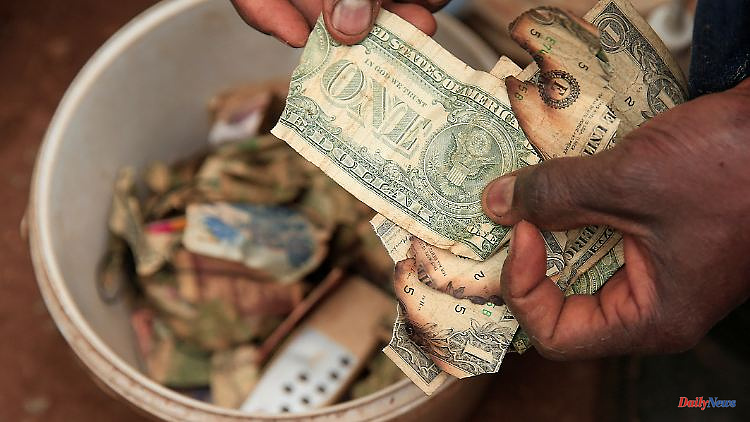Since the hyperinflation in Zimbabwe, the US dollar has been the currency of choice. But American banknotes are scarce. A black market has developed for cleaning and repairing old bills.
Washing, drying, gluing: In crisis-ridden Zimbabwe, worn-out US dollar bills are repaired - on the black market. A brisk trade has developed on the streets of the capital Harare. Torn banknotes are bought up for almost half their value, mended and then put back into circulation at a profit.
Black market trader Cuthbert Gudza turned it into a business. He holds up a two dollar bill to inspect a tear. Then he carefully glues it back together. He then puts the banknote in the sun to dry and says: "As good as new."
Since the Zimbabwean dollar collapsed in 2009 as a result of record-breaking inflation, locals have relied on the "greenback" for their daily transactions. But as access to the US currency is limited, even badly soiled or damaged bills are making a comeback. Torn dollar bills rejected by supermarkets and other official dealers have therefore found buyers like Gudza in a busy mall in Kuwadzana, near Harare.
The Zimbabwean banks are actually obliged to accept dirty money in exchange for fresh bills. But general distrust in the financial system after savings have been lost to hyperinflation has led to black market traders being preferred to banks.
In the Kuwadzana mall, a booming voice booms out of a portable speaker: "We're buying torn dollars at a good price, hurry up." 33-year-old Gudza explains how the business works: "If the serial number is visible from both sides, you can sell it". Actually, the father of three children is a potato seller. "But I saw buying torn US dollar bills as another business opportunity. These bills are rejected in supermarkets, but I accept them for resale."
Gudza pays 600 Zimbabwe dollars for every US dollar. "We sell our products, including potatoes, oranges and apples, to those who don't want money," adds Gudza. "If I can't patch up the bills, I'll take them to the bank."
The Central Bank of Zimbabwe is aware of this trend. She has therefore asked citizens to use the official channels to exchange old banknotes. "The central bank is aware of the soiled banknotes and if you have a problem, the central bank is willing to exchange them for better banknotes," says Persistence Gwanyanya, a member of the Reserve Bank of Zimbabwe's monetary policy committee. "The banks should be able to accept them."












